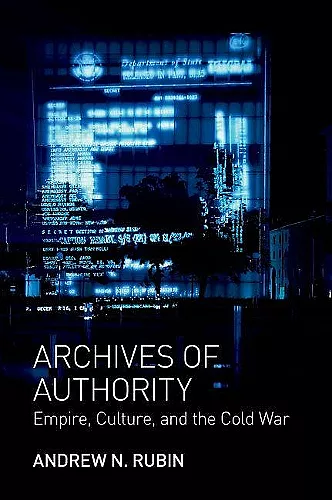Archives of Authority
Empire, Culture, and the Cold War
Format:Hardback
Publisher:Princeton University Press
Published:3rd Aug '12
Currently unavailable, and unfortunately no date known when it will be back

Combining literary, cultural, and political history, and based on extensive archival research, including previously unseen FBI and CIA documents, Archives of Authority argues that cultural politics--specifically America's often covert patronage of the arts--played a highly important role in the transfer of imperial authority from Britain to the United States during a critical period after World War II. Andrew Rubin argues that this transfer reshaped the postwar literary space and he shows how, during this time, new and efficient modes of cultural transmission, replication, and travel--such as radio and rapidly and globally circulated journals--completely transformed the position occupied by the postwar writer and the role of world literature. Rubin demonstrates that the nearly instantaneous translation of texts by George Orwell, Thomas Mann, W. H. Auden, Richard Wright, Mary McCarthy, and Albert Camus, among others, into interrelated journals that were sponsored by organizations such as the CIA's Congress for Cultural Freedom and circulated around the world effectively reshaped writers, critics, and intellectuals into easily recognizable, transnational figures. Their work formed a new canon of world literature that was celebrated in the United States and supposedly represented the best of contemporary thought, while less politically attractive authors were ignored or even demonized. This championing and demonizing of writers occurred in the name of anti-Communism--the new, transatlantic "civilizing mission" through which postwar cultural and literary authority emerged.
Winner of a 2013 Lannan Literary Fellowship for Nonfiction, Lannan Foundation "Archives of Authority is a valuable and thought-provoking work... Archives of Authority will be of great interest to literature scholars, postcolonial theorists, and Cold War specialists across the disciplines. Its critique of cultural instrumentality and appeal for a Said-inflected humanism speak to the stakes of intellectual inquiry, reminding us that in exposing the process by which an unjust world is made, we arm ourselves with the tools to build a different one."--Kirsten Weld, Journal of Archival Organization
ISBN: 9780691154152
Dimensions: unknown
Weight: 425g
200 pages